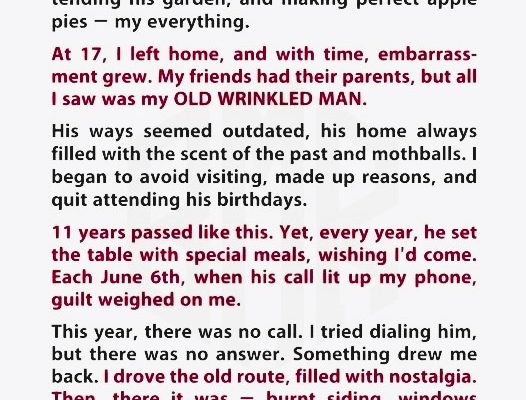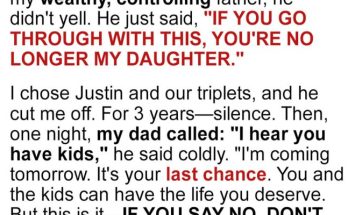I’m Caleb, and for 11 years, I ignored my grandfather’s birthday invitations. Life got busy—college, work, relationships—and I convinced myself his old-fashioned ways didn’t fit into my modern world. Grandpa Arthur raised me after my parents died, but I slowly distanced myself, ashamed of our simple life. Every June 6, he’d call, offer pot roast, and I’d decline with excuses. I thought I was building a future. I didn’t realize I was tearing down the past.
Grandpa was my anchor growing up. He taught me how to fish, garden, and listen—really listen—to stories that shaped our family. His porch was our sanctuary, his voice my compass. But teenage pride crept in. I started hiding him from friends, asking him to drop me off blocks away from school. I left for college and never looked back. Each birthday call became a burden I dodged. I thought I was evolving. I was just erasing him.
Then one June, the call didn’t come. At first, I felt relief. No guilt, no awkward decline. But days passed, and unease grew. I couldn’t shake the silence. I drove two hours to his house, hoping to surprise him. What I found instead was devastation—smoke-stained walls, shattered windows, a collapsed roof. My childhood home was a ruin. I called out for him, heart pounding. No answer. Just wind and ash.
Mrs. Harlow, his neighbor, appeared behind me. Her face was older, but her eyes were kind. She told me about the fire—an electrical blaze that nearly killed him. He’d been in the hospital for months. They’d tried to reach me. I was his emergency contact. All those unknown numbers I ignored? They were calls for help. My stomach dropped. I hadn’t just missed birthdays. I’d missed his fight for life.
She led me through the wreckage. The kitchen where he cooked pot roast was gone. The living room where we watched Westerns was charred. But in the back bedroom, one thing survived: his memory box. Inside were photos of my parents, of me as a child, and every birthday card I’d ever sent. Even the generic ones. He’d kept them all. “He reads these when he misses you,” she said. I couldn’t breathe.
At the hospital, I found him—frail, bandaged, but alive. His eyes lit up when he saw me. “You came,” he whispered. I broke down. “I’m sorry, Grandpa. I should’ve been here.” He took my hand and said, “You’re here now. That’s all that matters.” For a week, I stayed by his side, listening to stories I’d nearly lost forever. He’d been writing a journal for me, preserving our family’s legacy. I’d almost let it vanish.
Now, Grandpa lives in a small apartment near the hospital. I visit every weekend. We’re rebuilding—not just our relationship, but our history. Every June 6, I’m there with pot roast and stories. I learned that people don’t wait forever, but sometimes, they wait long enough. I was lucky. I got a second chance. Not everyone does. And every time I smell smoke, I remember what I almost lost.
Some people die twice—once when their body fails, and once when their stories are forgotten. I nearly let Grandpa die that second death. But I came back. I listened. I loved. And I’ll never miss another birthday again. Because the people who shape us deserve more than silence. They deserve our time, our presence, and our gratitude. I was late. But not too late.

